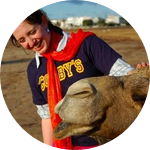About This Project
Higher levels of exercise have been linked to better sleep but it is unclear whether the time of day at which individuals exercise plays a role. This project examines whether the regularity and timing of exercise (early versus late), and circadian-type impact sleep. We examine these questions among athlete and non-athlete students to determine when (and for whom) does exercising lead to better sleep.
Ask the Scientists
Join The DiscussionWhat is the context of this research?
Along with a balanced diet, exercise is a key contributor to a healthy lifestyle. Indeed, exercise is linked to both physical and psychological well-being. Sleep is also a critical factor that affects overall health, particularly among students who typically are highly-stressed due to academic and social demands. Exercise has been linked to longer sleep but some experts warn that late evening exercise may impair sleep - a finding that is inconsistent across studies. An important but overlooked factor in past studies is the biological clock, which regulates wakefulness and sleep timing. Research is needed to assess whether the biological clock determines the time of day that is most optimal for exercising in order to promote a good night's sleep.
What is the significance of this project?
As a society, we are severely sleep deprived and many adolescents experience poor quality sleep. Short sleep is linked to an increased risk of all-cause mortality, poorer immune functioning, increased risk for heart disease and obesity, impaired relationships and emotional disorders. Therefore, it is critical to identify which factors improve sleep. Although exercise generally has been associated with good sleep, research is inconsistent in whether the time of day at which individuals exercise matters for promoting or disrupting sleep. Past studies, however, have largely ignored the role of the biological clock. Findings from this project will inform individuals in the general public, coaches, parents and students of the optimal timing of exercise for good sleep.
What are the goals of the project?
This project will examine whether the biological clock is responsible for determining whether both the regularity and timing of exercise promotes or impairs sleep. The biological clock will be measured both subjectively (self-reported morning- or evening- circadian type) and objectively (melatonin). Sleep will be measured using actigraphy (watch-like sleep monitor) and a sleep questionnaire. Additionally, we will measure cortisol, a physiological index of stress. Importantly, we assess associations among the biological clock, exercise, and sleep among both athletes ( students who compete in a sports team) and non-athletes (students who don't compete in a sports team) so that results are applicable for diverse groups of individuals.
Budget
Saliva collection kits are critical for the accurate collection, labeling and storage of saliva samples. Kits will include: plastic vials, straws, tissue, pens, labels, plastic bags and a timer. We will collect 42 saliva samples per participant (6 samples per day for 7 days). Saliva samples will be used to measure two important hormones: i) Melatonin (marker of circadian-type) and ii) Cortisol (index of HPA-axis functioning). Participant compensation will be a raffle prize for a consumer-level activity/sleep monitor. Recruitment costs include flyers and paid promotions on social media (e.g., Facebook, Twitter) in order to recruit participants to the study. As part of our stretch goals, sleep analysis software will be used to analyze sleep data from actigraphy (e.g., sleep duration, night awakenings, sleep efficiency); as well as to cover the cost of extrapolating melatonin and cortisol from saliva samples.
Endorsed by
Meet the Team
Team Bio
This project will be ran by the members of the Sleep and Psychosocial Adjustment Lab at Wesleyan University. Our team consists of a dedicated group of undergraduate students who are highly motivated and interested in understanding sleep and psychosocial adjustment.
Royette Tavernier, Ph.D.
I am a developmental psychologist, whose program of research examines associations between sleep and various aspects of psychosocial functioning, particularly among adolescents and emerging adults. My interest in sleep stems from the critical role that this important human behavior plays for a wide range of health and well-being outcomes. Although sleep plays a key role for well-being across the lifespan, adolescence and emerging adulthood are particularly sensitive age periods to study sleep because of the unique biological and environmental changes that interact to influence sleep-wake patterns during this period of development. Furthermore, because psychosocial functioning is multidimensional, my interest in sleep is in relation to a diverse set of factors, including academic performance, quality of interpersonal relationships, emotional adjustment, technology use and alcohol use, and physical health. My published work can be found here.
My interdisciplinary background is central to my research program. Consequently, I take a biopsychosocial approach to the study of sleep and psychosocial functioning. My profound interest in understanding the mechanistic pathways linking sleep and psychosocial functioning is driven by my desire to increase our knowledge and understanding of the various ways in which we can improve the lives of diverse groups of youth.
Additional Information
Importantly, this project employs a biopsychosocial approach to studying the associations among the biological clock (circadian timing), exercise and sleep. Along with participant-reported morning- and evening- circadian preference, we will measure both melatonin and cortisol at multiple times per day for a minimum of 7 days. Both hormones follow a strong diurnal rhythm and have been used to index circadian timing. Furthermore, in addition to participants' daily sleep logs of subjective perceptions of their sleep-wake timing and quality, we will use actigraphy. Actigraphy is based on the use of a built-in accelerometer in a watch-like device (worn on the non-dominant hand) to measure movement, from which a number of sleep characteristics can be estimated (e.g., bedtimes, wake times, number of night awakenings, total sleep time etc.). We will recruit both athlete- and non-athlete- students, who will fill out a baseline questionnaire at the beginning if their season, followed by daily sleep and exercise logs for 7 consecutive days while wearing a sleep monitor and collecting saliva samples, then finally complete an exit survey at the end of the spring semester. The findings from this project will have important implications for diverse groups of students, coaches, parents, and members of the general public, in terms of daily scheduling of exercise that is most optimal for a good night's sleep.
Project Backers
- 45Backers
- 167%Funded
- $1,842Total Donations
- $40.04Average Donation


